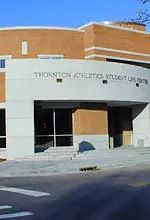University of Tennessee Athletics

UT SEES DRAMATIC RISE IN ATHLETIC ACADEMIC SUCCESS RATE
October 26, 2004 | General
Oct. 26, 2004
The University of Tennessee athletics departments announced today that the academic success rate for University of Tennessee student-athletes has risen dramatically. Last year, the university had an academic success rate of 86 percent. This year the success rate rose to 98 percent.
The academic success rate is calculated by taking the graduation rate for athletes who entered the university in 1997 and adding any student-athlete that left the university in good standing, which would include athletes who leave to pursue professional careers or transfer to another college or university. Football, men's basketball and women's basketball had a 100 percent academic success rate.
"By keeping our student-athletes in good academic standing, they are making a positive progression towards degree requirements which will ultimately have a positive effect on our graduation rate," said Ruth Darling, associate provost and director of the Thornton Athletics Student Life Center. "The mission of the Thornton Center and its staff is to help students meet that goal."
The University of Tennessee also improved its graduation rate for student-athletes during the same period. The graduation rate for University of Tennessee student-athletes rose from 42 percent to 57 percent. The rate is comparable to the general population at the university, which has a 58 percent graduation rate.
"We've made significant strides in our graduation rate," said Todd Diacon, faculty athletic representative. "Given all of the time demands on student-athletes, a graduation rate that is equivalent to the general student rate is positive."
The university is also trying to encourage former athletes who left in good standing to return to the university to achieve their degree.
Based in the Thornton Center, the Renewing Academic Commitment (RAC) Program works with former student-athletes by assisting them with advice on degree requirements remaining, course scheduling, tutoring, employment and internship opportunities offered through the CHAMPS/Life Skills Office, and use of the Thornton Center for their every day needs. The athletic departments pay tuition costs, books, and associated university fees for these returning student-athletes. Students must be committed to finishing their degree and making satisfactory progress in order to continue to receive this aid. There are currently around 25 former student-athletes that are working with the RAC Program and around another 15 that have inquired about returning to school in the near future. This past spring alone, there were five graduates in the RAC Program (Fred Jenkins in basketball; Reggie Coleman, Jay Graham, Steven Marsh, and Ben Talley in football).
Since the Thornton Center opened in 2001, Tennessee's student-athletes have achieved increasing success.
- In the 2003-04 school year, the University of Tennessee had 127 student-athletes who earned a place on the Southeastern Conference Academic Honor Roll, not including an additional 42 freshman student-athletes who made the list as well.
- For the fall of 2003, the Volunteers had 232 male and female student-athletes who achieved a GPA of 3.0 or higher and 209 male and female student-athletes who achieved a GPA of 3.0 or higher in the spring semester.
- Twenty-five female and 35 male student-athletes received degrees in 26 different majors in the 2003-04 school year. An additional six former student-athletes graduated through the Renewing Academic Commitment (RAC) program with degrees in three different majors.












